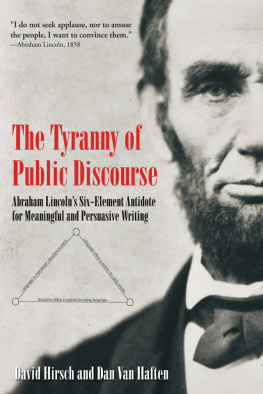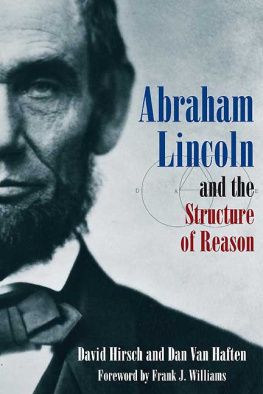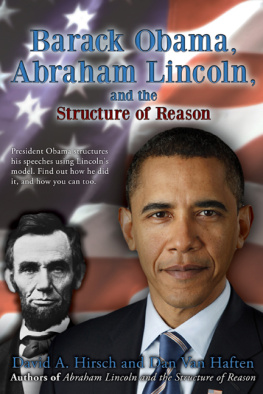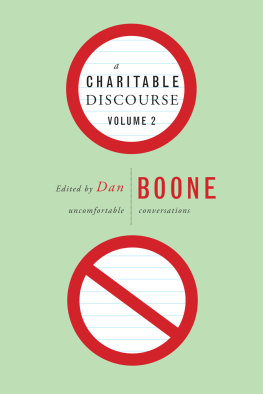Pagebreaks of the print version

The Tyranny of Public Discourse
Abraham Lincolns Six-Element Antidote for Meaningful and Persuasive Writing
David Hirsch and Dan Van Haften
Savas Beatie
California
2019 by David Hirsch and Dan Van Haften
The Tyranny of Public Discourse: Abraham Lincolns Six-Element Antidote for Meaningful and Persuasive Writing
All rights reserved. No part of this work may be reproduced, stored in a retrieval system, or transmitted, in any form or by any means, electronic, mechanical, photocopying, recording, or otherwise, without the prior written permission of the publisher.
Cataloging-in-Publication Data is available from the Library of Congress.
First hardcover edition, first printing:
ISBN-13: 978-1-61121-474-1
eISBN: 978-1-94066-992-2
First trade paperback edition, first printing:
ISBN-13: 978-1-61121-497-0
eISBN: 978-1-94066-992-2
Mobi ISBN: 978-1-94066-992-2
Savas Beatie
989 Governor Drive, Suite 102
El Dorado Hills, CA 95762
Phone: 916-941-6896
(E-mail)
(Web) www.savasbeatie.com
Savas Beatie titles are available at special discounts for bulk purchases in the United States by corporations, institutions, and other organizations. For more details, please contact Special Sales, P.O. Box 4527, El Dorado Hills, CA 95762. You may also e-mail us at for additional information.
P YRAMIDS
P REFACE
We recently added a question when we engage audiences: Are you satisfied with the current state of public discourse?
The uniform response is a loud and emphatic No.
The reply is always the same, regardless of politics. Todays public discourse typically starts with a conclusion and goes downhill from there. If there are talking heads, argument begins instantly and typically runs in circles. This is a dangerous path for a society that depends upon civility and virtue to survive.
This book can teach anyone how to use logic and reason to create persuasive writing. A byproduct of this is the civility that will ensue with an elevated public discourse. The Tyranny of Public Discourse: Abraham Lincolns Six-Element Antidote for Meaningful and Persuasive Writing establishes the six elements of a proposition as a verbal form of the scientific method. That might sound difficult to understand. It is not. And as you will soon see, this book sets it all out, step-by-step, from beginning to end.
A CKNOWLEDGMENTS
Jerry Courtney, Aaron Goldsmith, and Bill Funchion requested a path to internalize the persuasive structure of the six elements of a proposition. Thanks for identifying the need. Bill also commented on an early draft.
We thank Bic Bakkum for reading early drafts, Lylea Critelli for creative suggestions, Nick Critelli for being Nick, Jerry Courtney for unending enthusiasm, and Scott Koslow for asking the right questions.
Tony Livernois provided structural suggestions, Susan VanHaften found bumps in early versions of the text. Rod Mackler was a steady head. Shuky Meyer gave critical technical suggestions.
We thank James Cornelius for valuable advice, Dan Weinberg for unique knowledge, Bjorn Skaptason for questions and encouragement, Frank Williams for invaluable assistance, and Ted Savas for his unique publishing insight.
C ONVENTIONS
We attempted to preserve the integrity of original documents. Occasionally we added paragraphing for readability. For instance, we heavily paragraphed the Declaration of Independence (
In primary source Jefferson and Lincoln documents, if The Papers of Thomas Jefferson, The Papers of Thomas Jefferson: Retirement Series, or The Collected Works of Abraham Lincoln italicize words, we underline them (as Jefferson and Lincoln did in the handwritten originals). Brackets contain our text insertions that clarify a word or phrase. Bolded brackets contain existing insertions in cited quotations.
Spelling (including misspellings), grammar, letter case, abbreviations, archaic expressions, and Thomas Jeffersons frequent use of its for its, and past for passed, are preserved in letters, speeches, and quotations. Frequently Jefferson did not begin sentences with capital letters. He generally put a period after a day of the month (for example, May 26 is May 26. even if in the middle of a sentence), or year (for example, 1813 is 1813. even if in the middle of a sentence). Jefferson frequently used two-digit values for years (for example, 1813 is 13. even if in the middle of a sentence).
I NTRODUCTION
The Tyranny of Public Discourse is an easier read if you initially set aside what you already know about rhetoric, logic, facts, reasoning, argument, persuasion, and demonstration. Fine wine tastes best when poured into a clean and empty glass.
Compositions of Thomas Jefferson and Abraham Lincoln light a road to the persuasive structure of the six elements of a proposition. Lincoln put the goal succinctly: I do not seek applause, nor to amuse the people, I want to convince them.
Abraham Lincoln used the logical structure of a six-element proposition to draft the Gettysburg Address.
John Adams and Thomas Jefferson were members of the five-person Continental Congress committee appointed on June 11, 1776, to draft the American Declaration of Independence. In an August 6, 1822, letter to Timothy Pickering, Adams unknowingly articulated the reason (Reason third below) to internalize the six elements of a proposition. The letter explained Adams maneuver that resulted in Jefferson drafting the Declaration of Independence. Adams wrote, Jefferson proposed to me to make the draught.
Adams: I said, I will not.
Jefferson: You should do it.
Adams: Oh! no.
Jefferson: Why will you not? You ought to do it.
Adams: I will not.
Jefferson: Why?
Adams: Reasons enough.
Jefferson: What can be your reasons?
Adams: Reason firstYou are a Virginian, and a Virginian ought to appear at the head of this business. Reason secondI am obnoxious, suspected, and unpopular.
You are very much otherwise. Reason thirdYou can write ten times better than I can.
To understand any one element, there must be at least a rudimentary grasp of all six. While the six elements can be listed linearly, they interact multidimensionally. Each element synergistically connects to the other five with simple elegance and textured complexity. The result is natural persuasion.
The Tyranny of Public Discourse: Abraham Lincolns Six-Element Antidote for Meaningful and Persuasive Writing illuminates structured composition within the six elements of a proposition. The six-element method of composition embeds locational purpose into words. This is true whether leading a nation through a war with a Gettysburg Address (). Internalizing the six elements for writing and speaking provides rewards: Critical thinking becomes automatic; listening is artful; persuasive composition is natural; and leadership sharpens.
Thomas Jefferson was among Americas best educated individuals. The Tyranny of Public Discourse is the guidebook Lincoln lacked.
How did the six elements hide so long? What were the consequences? Are you satisfied with todays public discourse? Do you think there should be a better way? Would you like a competitive edge?










